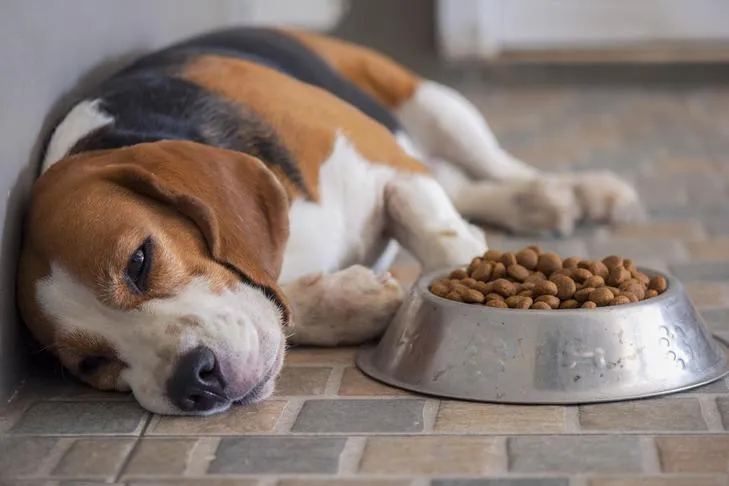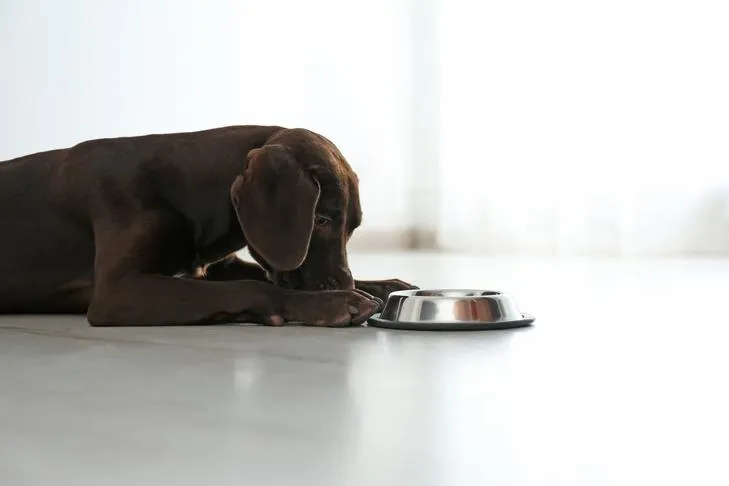Experiencing an upset stomach, accompanied by symptoms like decreased appetite, diarrhea, and vomiting, can be a worrying time for any dog owner. While seeking professional veterinary advice is paramount when your canine companion is unwell, understanding the right dietary choices can significantly aid their recovery. A carefully selected bland diet can not only alleviate discomfort but also provide essential nutrients for healing.
This guide will explore the best food options for dogs with mild stomach upset, focusing on easily digestible ingredients that offer a nutritional boost. We will also highlight foods to steer clear of to prevent further aggravation of their sensitive digestive system. Remember, these dietary recommendations are for supportive care and should always be discussed with your veterinarian, especially for senior dogs or those with pre-existing health conditions such as diabetes, cancer, or allergies, who may require specialized nutritional plans.
Understanding Why Your Dog Has an Upset Stomach
Just like humans, dogs can occasionally suffer from digestive distress. An upset stomach in dogs can manifest as gas, nausea, constipation, or diarrhea. While these symptoms can sometimes be indicators of more serious underlying health issues, mild cases can often be managed with dietary adjustments. It is crucial to consult your veterinarian before implementing any home treatment or dietary changes to rule out any serious health risks. Only proceed with these dietary recommendations once your vet has confirmed the issue is mild and has approved your dietary plan.
For senior dogs or those with chronic conditions like diabetes, cancer, or allergies, specific nutritional needs must be considered. These dogs may require additional support to maintain their health, and any dietary changes should be made under veterinary supervision.
 A Beagle dog resting near a full bowl of kibble.
A Beagle dog resting near a full bowl of kibble.
Best Foods for Dogs With Upset Stomachs
When your dog is experiencing mild stomach upset, opting for easily digestible and bland foods is key to soothing their digestive system. These food choices are generally well-tolerated by dogs with sensitive stomachs, offering vital nutrients to aid recovery while helping to regulate appetite and alleviate constipation.
Boiled Chicken and Rice
Chicken and rice are fundamental ingredients found in many commercial dog foods, and their gentle nature makes them ideal for soothing an upset canine stomach. This bland meal is also straightforward to prepare at home. You will need boneless, skinless chicken breasts and white rice. While brown rice is more nutritious, white rice is often preferred for upset stomachs due to its simpler composition.
It’s vital to avoid adding oils, butter, or seasonings, as these can irritate your dog’s stomach and exacerbate the problem. Stick to plain boiled chicken and rice. Ensure the chicken is thoroughly cooked and then shredded or cut into small, manageable pieces for easy consumption. For convenience, you can also find pre-packaged chicken and rice meals for dogs specifically formulated for sensitive stomachs.
Shredded Chicken
Plain, boiled, and shredded chicken is not only gentle on an upset stomach but also serves as an excellent appetite stimulant for dogs who are not eating well. It is easily digestible and provides a good source of essential vitamins, minerals, fats, and amino acids, making it a beneficial choice for dogs feeling unwell. Cooked chicken can be stored in the refrigerator for 3–4 days or frozen for up to 2–6 months for future use.
 A Cavalier King Charles Spaniel stands beside its food bowl at home. AVAVA via Getty Images
A Cavalier King Charles Spaniel stands beside its food bowl at home. AVAVA via Getty Images
Plain Pumpkin
Feeding your dog unseasoned, plain pumpkin can offer significant digestive health benefits. Its high fiber content aids in regulating the digestive system. Cooked, peeled, unsalted, and unseasoned pumpkin provides nutrients like vitamin E, iron, and potassium, offering both nutritional support and digestive relief.
Incorporating a small amount of pumpkin into your dog’s diet can help manage mild constipation. Veterinarians typically recommend one to four tablespoons of pumpkin per day, depending on the dog’s size. Canned pumpkin is a convenient option, provided it is pure, unseasoned pumpkin and not pumpkin pie filling, which contains spices and sugars that can further upset a dog’s stomach. You can also find pumpkin supplements specifically designed for dogs to be added to their regular food.
Bone Broth
Bone broth is a mild, liquid-based meal that is exceptionally easy for dogs with upset stomachs to digest. It also adds moisture and flavor to dry food, encouraging dogs with reduced appetites to eat. To prepare bone broth for dogs, use beef marrow bones or bones rich in joints, such as turkey or chicken legs, in a slow cooker. Cover the bones with water and cook on low for 20 to 24 hours.
After cooking, let the broth cool in the refrigerator so the fat solidifies at the top, then skim it off. Store the jelly-like broth in the refrigerator. If using it to moisten dry food, gently warm it until it reaches a liquid consistency, ensuring it’s not too hot to burn your dog’s mouth. For convenience, you can freeze the broth in small portions, like an ice cube tray, for later use.
While bone broth is beneficial, it is crucial to remove all bones from the broth before serving, as cooked bones can be dangerous for dogs. Straining the broth thoroughly will ensure no small bone fragments remain. If your dog has a sensitive stomach and you’re unsure about their reaction to different foods, consider what can I give my picky dog to eat for other suitable options.
 A German Shorthaired Pointer puppy lying next to its bowl indoors. ©New Africa – stock.adobe.com
A German Shorthaired Pointer puppy lying next to its bowl indoors. ©New Africa – stock.adobe.com
Meat-Based Baby Food
Veterinary emergency hospitals frequently use specific types of baby food to feed dogs under their care due to its ease of swallowing and digestion. It’s also an effective way to administer oral medications. Opt for Stage II meat-based baby foods, such as chicken, lamb, or turkey, ensuring they do not contain ingredients or additives that could be toxic to dogs, like garlic or onion powder. If your dog has a sensitive digestive system and you’re exploring options, understanding what can dogs eat in human food can provide additional insights.
Foods to Avoid
While certain human foods can help settle a dog’s upset stomach, others can worsen the condition or even pose a health risk. It is essential to avoid feeding your dog the following foods, especially when they are experiencing digestive issues:
- Foods cooked with garlic, oils, or seasonings: These ingredients can be harsh on a sensitive digestive system.
- Milk or dairy products: Many dogs are lactose intolerant, and dairy can lead to vomiting or diarrhea.
- Processed meats like ham, bacon, or pepperoni: These foods are often rich, fatty, and high in salt, which can be detrimental to a dog with an upset stomach.
It is crucial to remember that these dietary recommendations are not a substitute for professional veterinary care. However, implementing a bland diet can significantly alleviate your dog’s intestinal discomfort while also offering them palatable food options. When in doubt, always consult your veterinarian before making any changes to your dog’s diet. If your dog has specific health issues, such as pancreatitis, understanding my dog has pancreatitis what can i feed him is crucial. For dogs who are refusing to eat altogether, exploring what can i give my dog to make him eat might be helpful after consulting with your vet.
